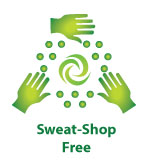Sweatshop-free
Sweatshop-free refers to products manufactured in an environment where workers are paid fair wages, work reasonable hours, and labor under safe conditions. This concept is part of the broader ethical consumerism movement, which advocates for the purchase of goods produced in a manner that is socially and environmentally responsible. The term "sweatshop-free" is often associated with clothing and footwear, but it can apply to any product that is produced under fair labor practices.
Definition and Criteria[edit | edit source]
A sweatshop-free label implies that the products are made under conditions that respect the rights and dignity of workers. The criteria for determining whether a production facility is sweatshop-free include:
- Fair wages that meet or exceed the local living wage
- Reasonable working hours with voluntary overtime paid at a premium rate
- Safe and healthy working conditions
- The right for workers to organize and bargain collectively
- No discrimination in employment
- No use of child labor
History[edit | edit source]
The concern over sweatshops gained prominence in the late 20th century, with globalization leading to an increase in manufacturing in countries with lower labor costs and less stringent labor laws. High-profile scandals involving major brands highlighted the poor conditions under which some products were made, leading to public outcry and a demand for change. This has prompted some companies to adopt sweatshop-free policies and for independent certification schemes to emerge, verifying the ethical credentials of products.
Challenges[edit | edit source]
One of the main challenges in achieving a sweatshop-free industry is the complexity of global supply chains. Many companies outsource production to contractors and subcontractors, making it difficult to monitor and ensure compliance with ethical standards. Additionally, there is no universally accepted definition of what constitutes fair labor practices, leading to variability in the standards applied by different certification schemes.
Impact[edit | edit source]
The movement towards sweatshop-free products has had a significant impact on the industry. It has raised awareness among consumers about the conditions under which products are made and has increased demand for ethically produced goods. This, in turn, has pressured companies to improve labor practices in their supply chains. However, the effectiveness of these changes is often debated, with critics arguing that more systemic changes are needed to address the root causes of exploitation in global manufacturing.
See Also[edit | edit source]
Search WikiMD
Ad.Tired of being Overweight? Try W8MD's physician weight loss program.
Semaglutide (Ozempic / Wegovy and Tirzepatide (Mounjaro / Zepbound) available.
Advertise on WikiMD
|
WikiMD's Wellness Encyclopedia |
| Let Food Be Thy Medicine Medicine Thy Food - Hippocrates |
Translate this page: - East Asian
中文,
日本,
한국어,
South Asian
हिन्दी,
தமிழ்,
తెలుగు,
Urdu,
ಕನ್ನಡ,
Southeast Asian
Indonesian,
Vietnamese,
Thai,
မြန်မာဘာသာ,
বাংলা
European
español,
Deutsch,
français,
Greek,
português do Brasil,
polski,
română,
русский,
Nederlands,
norsk,
svenska,
suomi,
Italian
Middle Eastern & African
عربى,
Turkish,
Persian,
Hebrew,
Afrikaans,
isiZulu,
Kiswahili,
Other
Bulgarian,
Hungarian,
Czech,
Swedish,
മലയാളം,
मराठी,
ਪੰਜਾਬੀ,
ગુજરાતી,
Portuguese,
Ukrainian
Medical Disclaimer: WikiMD is not a substitute for professional medical advice. The information on WikiMD is provided as an information resource only, may be incorrect, outdated or misleading, and is not to be used or relied on for any diagnostic or treatment purposes. Please consult your health care provider before making any healthcare decisions or for guidance about a specific medical condition. WikiMD expressly disclaims responsibility, and shall have no liability, for any damages, loss, injury, or liability whatsoever suffered as a result of your reliance on the information contained in this site. By visiting this site you agree to the foregoing terms and conditions, which may from time to time be changed or supplemented by WikiMD. If you do not agree to the foregoing terms and conditions, you should not enter or use this site. See full disclaimer.
Credits:Most images are courtesy of Wikimedia commons, and templates, categories Wikipedia, licensed under CC BY SA or similar.
Contributors: Prab R. Tumpati, MD

